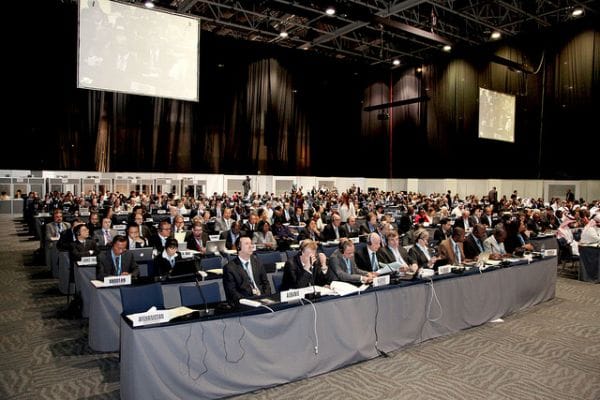Worry Circulates Around World Conference on International Telecommunications

Photo: World Conference on International Telecommunications

Last week IVN reported on the worry, and anticipation, over the World Conference on International Telecommunications. Over 190 entities are participating in the conference, which began December 3, and many groups have expressed their concern about its potential outcomes, which some fear will limit freedom and put a price tag on internet use.
Most importantly, the conference will be taking place behind closed doors, making it difficult to gauge whether or not the actions discussed are actually reason for concern. Overall, it is apparent that making decisions about protecting a "free and open internet" from behind an impenetrable wall is questionable and potentially suspicious. The WCIT website claims the meeting is designed to create a "binding global treaty designed to facilitate international interconnection and interoperability of information and communication services, as well as ensuring their efficiency and widespread public usefulness and availability." Yet, organizations from Google to the New America Foundation have circulated petitions to protect the Internet's integrity.
The White House is opposing international efforts to expand global regulation of telecommunications, despite attempts to pass bills like the Cybersecurity Act earlier this year. (The act was eventually blocked). The Federal Communications Commission, the State Department, and the National Telecommunications and Information Administration all posted a statement about the WCIT just before the gathering began. The statement highlighted America's commitment to a transparent, free and inclusive internet.
no one partyst
Republican Greg Walden (R-Oregon), the chairman of the House Subcommittee on Communications and Technology said the administration's position is hypocritical. Walden pointed out earlier this week that internet regulation via the United Nations will use cybersecurity as a "justification" for drafting restrictive legislation requiring companies to meet certain Internet usage requirements within their own countries.
The Internet is becoming an extremely pertinent issue for governments to address, as cybersecurity becomes an increasing concern to national security and the stakes become higher in maintaining control over the borderless space. Particularly given the role of the Internet in uprisings such as the Arab spring in the last two years, it has become a serious concern that regulation will stifle freedom of information and speech and give governments the power to dictate the way users interact in cyberspace. The outcome of the WCIT will be closely watched and even if a global deal is brokered, it most certainly will only be the beginning of a debate on the territoriality of the modern Wild West.


